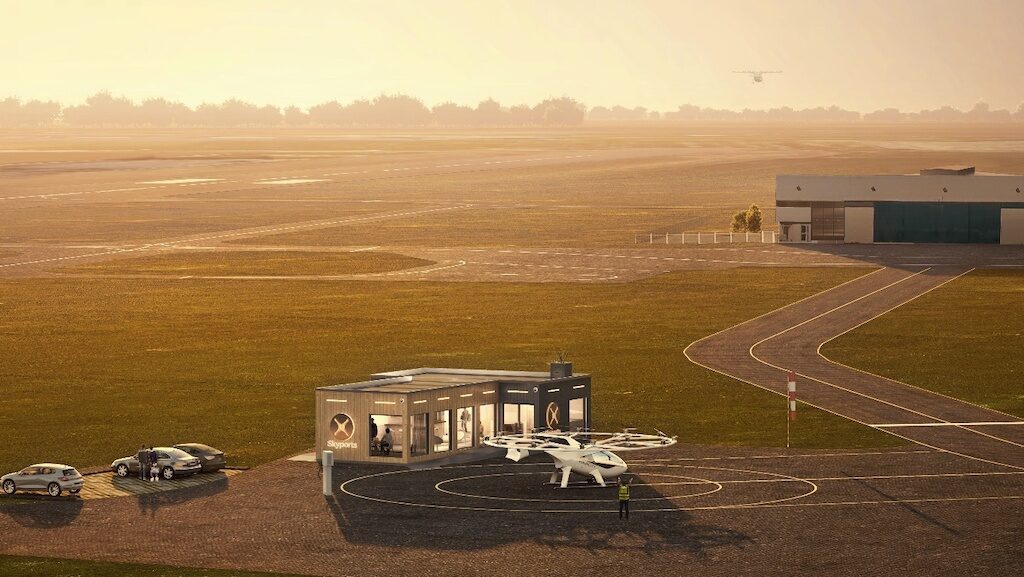
A computer-generated rendering of the future vertiport being developed by Skyports to be deployed in Paris ahead of the 2024 Olympics. (Skyports)
The first commercial vertiport in Europe, designed specifically for Advanced Air Mobility (AAM) aircraft, is scheduled to debut in 2024 following the Paris Olympics.
The company behind this development is the London-based Skyports, which designs, builds, and operates both take-off and landing infrastructure for air taxis. They also collaborate with electric vertical take-off and landing (eVTOL) passenger and cargo vehicle manufacturers worldwide.
Ankit Dass, CTO at Skyports, emphasized the importance of both safety and efficiency in vertiports, noting, “The integration of technology is at the core of our vertiport design, development and operation.” Skyports collaborates closely with vehicle manufacturers, operators, and leading aviation tech companies to develop their systems’ focus on operational efficiency and safety.
Matching the industry’s ambition to practicality remains a priority. The most significant challenge hindering urban air mobility (UAM) is infrastructure, according to a 2021 report from the European Union Aviation Safety Agency (EASA). Felipe Varon, founder and CEO of Varon Vehicles, said, “The biggest challenge in creating vertiports is matching the idea of a vertiport with a real, down-to-earth, business operation.” Lilium, an eVTOL company that is planning a network of 14 vertiports across the state of Florida, hopes to implement its lean, modular approach to ensure vertiport accessibility to developers of all sizes.
Vertiports and eVTOLs are more than welcome in Miami, according to Mayor Francis Suarez. The New York Times wrote that the City of Miami “is embracing eVTOLs as a cost-effective, environmentally friendly alternative to legacy modes of transportation like buses and light rail, which are costly to build and rely on older technology.” Mayor Suarez said existing parking garages and rooftops are being considered by the City as potential locations for takeoff and landing.
The “Re.Invent Air Mobility” initiative, led by Groupe ADP, a French airport operator; RATP Group, a global mobility company; and Choose Paris region, a French business and innovation agency, recognized Skyports as an innovator for urban infrastructure along with several other organizations. Development of this vertiport is part of “Re.Invent Air Mobility” that includes an opportunity to showcase innovations at the Paris Olympics as well as assistance in scaling up operations from 2024–2030.
Backed by DGAC, the French Civil Aviation Authority, and EASA, the building and initial testing of this vertiport will take place at Groupe ADP’s Cergy-Pontoise Airfield in Paris. Prominent eVTOL vehicle developers Volocopter, Vertical Aerospace, Airbus, Pipistrel, and eHang also have the opportunity to conduct test flights and demonstrations in the years leading up to the 2024 Olympics.
In October, an infrastructure-as-a-service company—Urban-Air Port Ltd (UAP)—announced a partnership with Munich Airport International for developing ground infrastructure at the airport to support eVTOL operations. UAP aims to pursue additional strategic partnerships and opportunities with leading eVTOL developers in order to develop “the full ecosystem to enable air mobility to take flight,” said UAP Founder & Executive Chairman Ricky Sandhu.
Chairman and CEO of Groupe ADP, Augustin de Romanet, remarked that the “Re.Invent Air Mobility” experiments at the Pontoise airfield serve to “explore the field of possibilities of a decarbonised and innovative aviation, and to develop the low altitude aviation market (below 300 metres). […] Groupe ADP will fully play its role as an aggregator of activities to facilitate the surge of new uses that reconcile a smaller environmental footprint, innovation and common utility.”
Some of the technologies included in Skyports’ vertiport will be biometric identity management, re-charging equipment, situational awareness capabilities, and weather stations. The modular technology used in construction of the vertiport will facilitate its transport to a new location in France where it will operate as a commercial vertiport.